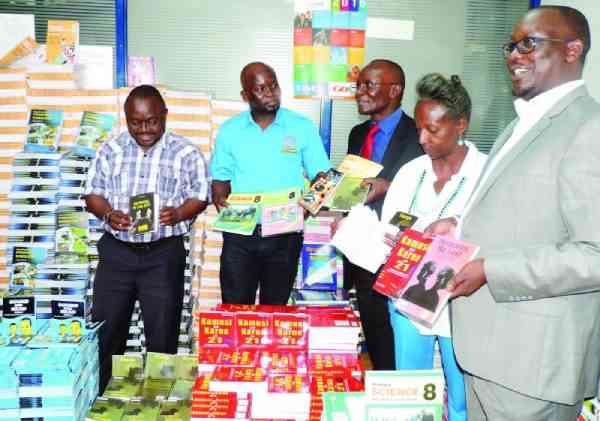You have all seen them; the street vendors selling books on almost every street corner. Book lovers fondly refer to them as Inama bookshops. This is where you can get books at very affordable prices, especially second-hand ones.
Lots of people have enriched their home libraries courtesy of Inama bookshop, including yours truly. While second-hand books are okay, it is the sale of new releases that tends to be rather tricky. Whenever you encounter books freshly off the press, or on the streets, there are high chances that that book could be pirated.

This reality dawned rather painfully on Nigerian author Lola Shoneyin when she visited Nairobi last month. Shoneyin, author of The Secret Lives of Baba Segi's Wives, was in the country for the NBO Litfest, where she took writers through a writing masterclass.
It was while she was signing autographs for her books that a fan proffered a copy that looked off. "I saw the front cover; looked at the back and straight off knew it was a pirated copy," Shoneyin said in a podcast interview. "I was shocked at how poorly the book had been produced."
There are only two editions of her book, the American and UK editions, each with different covers. She knew that the book was pirated as what the fan presented to her was not what the two official editions looked like.
Confronted with the obviously pirated copy, Shoneyin and her hosts knew that there must be more where the offending book came from. Together with Muthoni Muiruri, a co-director of Soma Nami Books, she decided to pay the street book vendors a visit.
The discovery was deeply distressing for the author. "I have always boasted that my novels have never been pirated, not even in Nigeria," she said. While her theory about Nigeria is yet to be tested, she realised, much to her dismay, that piracy is alive and well in Kenya and that the popular Inama bookshops are the outlets. In the streets she encountered different versions of her book, all pirated. Some copies even had her name spelled wrong!
Not only that, they encountered many other books written by African authors that were clearly prated. A copy of Chimamanda Ngozi Adichie's Americanah started off on Chapter 38. Other African authors whose pirated copies were found in the streets included Zimbabwean NoViolet Bulawayo, Nigerian Chika Unigwe and Nana Darkoa (Ghana), who wrote the acclaimed The Sex lives of African Women.
The common theme with the pirated books Shoneyin encountered on the streets of Nairobi, was in the shoddy physical attributes. The binding was off and the minute you open the book; it starts falling off at the seams.
Conflicted
The shocking discovery left her somewhat conflicted. "I am quite happy that people somehow seem to be interested in books and that books are in such high demand," she said, but quickly added that as a result of piracy, she is denied much-needed revenue in the form of royalties.
"When you write a book, you sign a contract with a publisher to get royalty," she told the Soma Nami Podcast. "An author hopes to get something when the book sells. With piracy, every penny generated goes into the pocket of the criminal. In essence, people who buy pirated books are enabling criminality."
Piracy, she explained, is driven by demand. "It is also driven by greed. Pirating books is a criminal offence," added Shoneyin. "If you are caught, you are basically handling stolen goods and are liable to being prosecuted."
Demand for books, while in itself is a good thing, the people seeking to buy books often find prices in conventional bookshops out of reach and thus opt for the street vendors who will offer the books cheaply.
"The pirated copies are negotiable so the vendor will quote say Sh800 but you can buy at any rate depending on your negotiation skills. The original book is PS9 (Sh1,640)," said Wendy Njoroge, a co-director of Soma Nami Books.
Citing the poor quality of the pirated copied they saw, Shoneyin says she feels sad for the person who buys a book in such awful condition. "This is really a rip-off!" she said.
Shoneyin has received feedback from readers who have enjoyed reading her book and who now ask her to write a second one. "If you want me to write that second book then you got to make sure I am not cheated out of my royalty," she said, adding this can only happen when people buy books from established bookstores.
For the longest time, book piracy in Kenya has traditionally affected fast-moving books like secondary school set books and popular supplementary texts. If you talk to local publishers, they will tell you that pirates have gotten so sophisticated that they produce books of better quality that the original. These ones even print their books overseas.
However, the ones that pirated Shoneyin books are the unsophisticated types who photocopy or scan original books and take them to backstreet printers, who then flood them in the streets.
Edward Sigei, the Executive Director of the Kenya Copyright Board, told The Nairobian that since copyright is private property, copyright holders should report to the board.
 The Standard Group Plc is a multi-media organization with investments in media
platforms spanning newspaper print
operations, television, radio broadcasting, digital and online services. The
Standard Group is recognized as a
leading multi-media house in Kenya with a key influence in matters of national and
international interest.
The Standard Group Plc is a multi-media organization with investments in media
platforms spanning newspaper print
operations, television, radio broadcasting, digital and online services. The
Standard Group is recognized as a
leading multi-media house in Kenya with a key influence in matters of national and
international interest.









